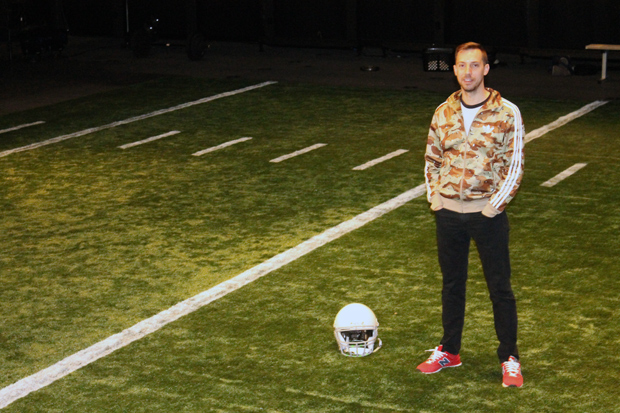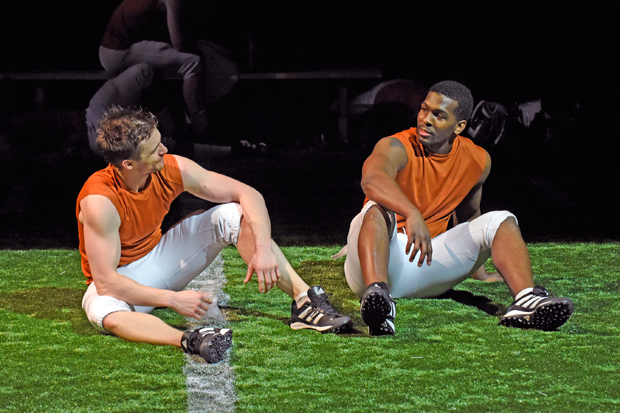After the tragic passing of Bruce Wood, DTC’s Kevin Moriarty tapped Joshua L. Peugh for the sport-themed play ‘Colossal,’ which explores the complexities of male relationships … including being gay in football

THE MISSING MAN FORMATION | Joshua L. Peugh — who always dreamed of choreographing a dance using football gear — stepped in to design the movement for the sports drama ‘Colossal,’ when his colleague Bruce Wood died. The play, which employs actual college athletes in its cast and has its world premiere this week, converts the inside of the Wyly into a football stadium. (Arnold Wayne Jones/Dallas Voice)
ARNOLD WAYNE JONES | Executive Editor
It’s a surprising statistic that more people see live theater every year than watch professional sports in person, but for Kevin Moriarty, it sometimes seems they are the same thing. Since becoming Dallas Theater Center’s artistic director in 2007, Moriarty has overseen a number of plays with sports themes: Back Back Back (baseball), Give It Up!/Lysistrata Jones (basketball), The Elaborate Entrance of Chad Deity (pro wrestling) among them. Add to that roster the latest rolling world premiere from DTC: The college football drama Colossal.
But this being Moriarty, nothing is every what it seems. Back Back Back has at its heart issues of steroid use and honor, Lysistrata sexual gamesmanship, Chad Deity about the perversion of the American Dream. And Colossal? Nothing less than what it means to be a man.
That theme is portrayed in a variety of expressions in Andrew Hinderaker’s new play, set at the University of Texas at Austin. As it starts, a promising football star named Mike (played by real-life quadriplegic actor Zack Weinstein) has been felled by a tackle, severing his spinal cord and leaving his a paraplegic. This forces him to confront not only his estranged father Damon (played by Joel Ferrell), a respected dancer and choreographer disappointed that his son pursued sports instead of the arts (“It’s sort of the anti-Billy Elliot,” Moriarty jokes), but also to deal with his coach and the teammate with whom he’s been secretly involved romantically … all while robbed of the mechanism by which he has always communicated with other men: His physicality.
“What do you do when your world collapses around you?” Moriarty asks rhetorically about the primary issue of the play. “How do you go to move forward when everything you know about yourself has been ripped from under you?” And, he says, a major component of that “is what it means to be gay in football.”
The sports metaphor stands in for the cues men use to communicate — how they “spoke previously with their bodies and after have to use language, when a father and son’s primary way of communicating has been through physicality but now one of them doesn’t have that,” Moriarty says.
Moriarty admits he was caught off-guard by how compellingly the play captured his imagination. He agreed to read the script and meet with the playwright more as a favor than a desire to develop a new property. He actually only read it hours before his scheduled meeting with Hinderaker. But he was instantly hooked. Always the devoted collaborator, Moriarty instantly decided to partner up with famed North Texas choreographer Bruce Wood in bringing the show to the stage.
“When I first read it I thought of Bruce immediately,” Moriarty says. From his Texas roots to his sports background and artistic temperament through which he explored issues of masculinity, “I kept thinking how Joel’s character was essentially Bruce — his pridefulness about gender and his deep desire to be sensitive was very important [to my vision of the production]. I expected Bruce would be essentially my co-director.” The team was announced last spring.

BROKEBACK SQUAD | Young Mike (Alex Stoll) and Marcus (Khris Davis) are teammates who have a clandestine romance that is interrupted by tragedy in ‘Colossal.’ (Photo courtesy Karen Almond)
And then, as with the character in the play, that world collapsed. Last May, Wood suddenly succumbed to pneumonia and heart failure owing to his HIV status. It was devastating for Moriarty personally as well as professionally — his voice cracks slightly when talking about it still — but as everyone in theater knows, the show must go on.
Realizing he needed someone else to design the movement for the show, Moriarty tapped Joshua L. Peugh. “I don’t think there is any replacing Bruce — he’s sort of an icon for the community,” Peugh says. “But being asked to step in was sort of strange. Harry Feril [a company member with Bruce Wood Dance Project] is in the company of Colossal, and I can absolutely see Bruce’s [life] in the plot — his father was a football coach!”
The selection had a sort of circularity to it: An SMU grad, Peugh was recruited by Wood in 2012 to return to Dallas and work with him. He did, though shortly thereafter left to devote himself to developing his own company, Dark Circles Contemporary Dance. But despite their history, Colossal is Peugh’s own work.
“Joshua is not doing this ‘in the style’ of Bruce Wood,” Moriarty explains. “He brings a different energy to the [collaborative process]. For one thing, he’s a younger generation and has a different relationship to masculinity. And his choreography is his own.”
Peugh conceded as well that while Wood started out as an athlete, that was something new to him.
“I never played much sports,” he admits. “I played soccer, and I lived in Korea for six years where they are obsessed with it.” But working with the all-male cast of Colossal — a combination of actors, dancers and athletes making their stage debuts (“one had never even seen a play before being cast!” Moriarty says) — has been a learning experience and much as a teaching one for Peugh.
“I almost always try to work without a mirror so that my dancers feel how it’s supposed to look and not just see it. [The athletes] have no preconceived notions [about what a step is supposed to be] — everything is new to them, and they have this great work ethic. They are used to going to practice and repeating it until they get it right. And they are incredibly aware of their bodies — they know exactly how long it takes them to stop and where their bodies are in space. And for the most part they blend in really well with the actual dancers.”
The dance highlight is a 10-minute performance at “halftime” (the play runs without an intermission, but follows the structure of a football game), but Peugh was also instrumental in working with the actors, choreographing their movement (In real cleats! On actual AstroTruf!) during the non-dance portions.
“I’ve always been interested in athletic movement and have wanted for a long time to design a concert dance using football gear, a drumline, stadium lights … and we have all that here!” Peugh says.
Indeed, Moriarty was devoted to transforming the very flexible space of the Wyly Theatre into a football field. Audience members sit in bleacher-like risers, and enter in groups, having to actually walk across the field to get to their seats. He always knew he wanted to create the sporting-event atmosphere inside the space, though he admits that changed some when he started working with designer John Coyne.
“John thought my idea was a mistake, because while there are 20 men in the play, it also has to be very intimate — the soul of the show are these two-character scenes,” he says.
Two of those characters are Mike (played in flashbacks as the able-bodied athlete by Alex Stoll) and his closeted boyfriend and teammate Marcus (Khris Davis). But for Moriarty, that is merely one of the essential male relationships that is explored in the play. Ultimately, it is not a forbidden romance but an examination of communication.
This article appeared in the Dallas Voice print edition April 3, 2015.










